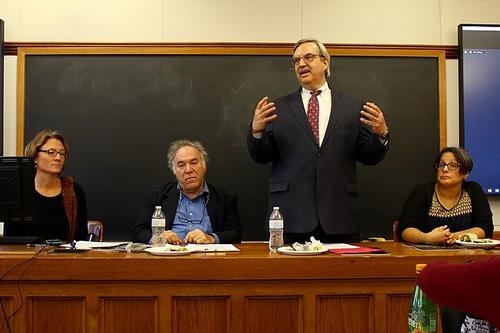
The state’s top bank regulator promised to push financial institutions to pay more attention to the plight of the mentally ill, who are often getting ripped off, no matter where they put their savings.
Banking Commissioner Jorge Perez, a former New Haven Board of Alders president, made that promise Wednesday afternoon in a Yale Law School classroom during a presentation about the ways lenders and insurers can do a better job of helping the tens of millions of Americans living with a mental health disability to manage their own money.
People with mental health disabilities often have a tougher time keeping their household finances straight.
Beyond the higher medical expenses, their mental illness might cause them to struggle with complex decisions, to drop routine tasks, to act impulsively and to forget basic information — possibly resulting in unpaid bills, overdrawn accounts or high-interest deals that could all worsen their condition with more stress.
“Financial and mental health are interrelated,” said Kathy Flaherty, the executive director of the Connecticut Legal Rights Project. “Being a poor person in Connecticut is a struggle. We know what it’s like for people who live in poverty in this state. If you didn’t have a mental health condition before, you would have one just by living in this state.”
But that doesn’t mean that people with mental health disabilities can’t do it on their own.
They don’t necessarily need a conservator or representative payee, who might charge as much as $400 an hour in attorney fees.

A cross-section of advocates — researchers, social workers, psychiatrists and lawyers — said that there should be an in-between, which they said banks could easily offer.
Currently, in New Haven, nearly half of the city residents who have a mental health disability aren’t using a bank, even though most of them had an account in the past, said Annie Harper, an instructor at the Yale School of Medicine who studies poverty.
“How do you get money? How do you pay big bills? How do you buy a cup of coffee? How do you deal with a larger-than-normal expense, like Christmas presents or vacation planning? How do you borrow money? How do you get insurance?” Harper asked. “Banking services are essential for everyone. It’s not just about promoting business; it’s enabling a person to manage the flows of money in and out of their lives. It affects every aspect: their economics, their social relationships, their health and well-being.”
In “Banking for All,” a report Harper put out this spring (along with Brittany Farr and Brian Cash), suggested that banks could allow account-holders to set custom mobile notifications, self-imposed spending limits, and view-only access. They say that those supportive features would be helpful for anyone, especially a big population of seniors.
Harper called it “positive friction,” essentially “making it harder for people to make a financial decision they might later regret.” The banks might allow a person to block any transactions from gambling websites, to require next-day confirmation for any late-night purchases, or to alert family members for overdrafts.

Paul Hammer, a local biking advocate, said one of the first signs of his bipolar disorder was his spending, as he blew through an inheritance “as if there was no tomorrow,” he recalled. After he was diagnosed, his finances were handed over to a conservatorship for eight years. But while attorneys were supposed to be keeping records, the federal government said it overpaid him by $22,000 — a charge he’s still fighting.
“The only thing these conservators ever did was hand me my Social Security check,” Hammer said. “To my knowledge, they were paid by the probate court for basically doing nothing. Perhaps they deemed me capable of taking care of my own financial affairs, despite the fact that the probate court had determined I was incompetent.”
Hammer called the suggestions in Harper’s report “groundbreaking,” and he said that they could make an enormous difference for people with mental health disabilities if they were developed and advertised on bank websites and branch lobbies.
However, some advocates questioned whether this particularly vulnerable group should rely on banks to help them out, especially when so much of their revenue now comes from overdraft fees.
Corey Stone, a senior adviser at the Oliver Wyman consulting firm who previously worked at the Consumer Financial Protection Bureau, added that there might be an “incentive problem” with rolling out these supports, because a bank makes more money on “a poor person screwing up” than the one who doesn’t overspend.
“I don’t know if I would tell anyone to go into the bank and trust them,” added Marc Rosen, a staff psychiatrist for the Veterans Administration.
Hammer responded that it’s not a bank teller’s job to tell a person to see a psychiatrist, but he said financial institutions can do more to help all their customers in distress, with something as simple as a referral to the New Haven Financial Empowerment Center.

Perez said that, in his sit-downs with banking executives, he’d already asked them to consider how they could add supports for people with mental health disabilities.
While that’s a voluntary effort for now, he added that his agency could eventually make it mandatory through the Community Reinvestment Act, which requires financial institutions to meet the credit needs in the neighborhoods around their branches.
Through that federal law, “you have to make [financial services] available to the entire community,” Perez said. “If I regulate you, this would be something we’ll look at. With time, you will lose points if you don’t comply.”
“What that will look like, I want to work with the regulated entities and the advocates to figure out,” he added. “I don’t want people to be treated differently. [Banking] should be available to everybody.”
- by Christopher Peak